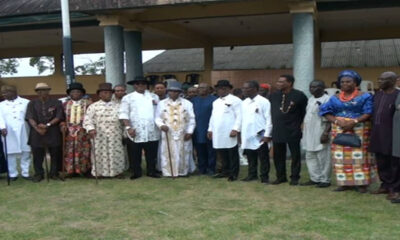Oil & Energy
Environmentalist Wants FG To Stop Gas Flaring
An environmentalist, Mr Surveyor Efik, has urged the Federal Government to mitigate the impact of climate change by stopping gas flaring.
Speaking with newsmen in Abuja, Efik, who is also the National Coordinator of Climate Change Network, an NGO, called for the formulation of a framework to stop gas flaring.
“The amount of associated gas that is being emitted or being flared since oil exploration and exploitation activities started is about 40 per cent of the total gas consumed in Africa.
“So, that amount of gas alone going to the atmosphere is contributing to greenhouse gas emission and for us to address it, I know Nigeria’s economy depends on oil and gas sector, this Petroleum Industry Bill, if well implemented, will address the issue of gas flaring seriously.
“It will hold these oil companies and bring them into order.
“Indonesia did that some few years ago; they started with regulating the oil industry activities with a legal framework, like we have put forward the Petroleum Industry Bill.
“All those oil companies, including Shell, which is also there in Indonesia, they are abiding by the laws and playing by the rules.’’
Efik also advised government to invest in climate change activities to mitigate its impact on the population.
He said such effort would encourage developed countries to support the nation’s climate change activities.
The coordinator said the National Adaptation Strategy and Plan of Action for Climate Change in Nigeria (NASPA-CCN) should be given financial backup to achieve the desired results.
He commended the Minister of Environment, Mrs Hadiza Mailafia, for developing the NASPA-CCN, which spells out the roles of all stakeholders regarding climate resilience adaptation in Nigeria.
Efik called on environment stakeholders to intensify awareness on the dangers of climate change.
“Let us create more awareness on the consequences, on the vulnerability; let people know how vulnerable Nigeria is; let them also know the consequential disaster that we might face if we don’t take precaution.
“If we carry out this advocacy, we’ll also make all the stakeholders that is the government stakeholders, the private sector stakeholders, the civil society stakeholders up to the communities, to know the roles they should play, the responsibilities they should take.
“So, if you and I play our roles, I think we will be able to overcome the future disastrous consequence that we might likely face, if we don’t do it today.’’
Efik also urged government to provide the required funding and undertake institutional reforms such as the creation of a Climate Change Commission.
Oil & Energy
States Can’t Slash Electricity Tariffs – NERC

Oil & Energy
Tinubu Backs N4trn Bond To Resolve Power Sector Liabilities

Oil & Energy
Oil Sector Slowdown’ll Threaten 2025 Budget Execution – NESG

-

 News1 day ago
News1 day agoFubara Hails Wike Over UNIPORT Doctorate Award
-

 News23 hours ago
News23 hours agoBayelsa Mulls 33 LGs, Others … As House Comm’tte Holds Public Hearing
-

 Sports24 hours ago
Sports24 hours agoSchool of Legal Studies Wins CEAPOLY Sports Competition …As Science And Tech Wins Football Category
-

 Politics22 hours ago
Politics22 hours agoADC Alleges Intimidation Against Governors Willing To Join Party
-

 Editorial1 day ago
Editorial1 day agoUNIPORT @50: Celebrating Excellence
-

 News23 hours ago
News23 hours agoFG Partners Stakeholders To Boost Food, Nutrition Safety
-

 News20 hours ago
News20 hours agoPeace Returns To Rivers Community
-

 News1 day ago
News1 day agoRivers Remains Committed To Upholding NYSC Ideals -SSG

